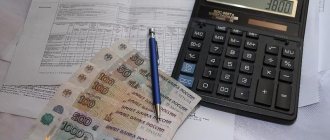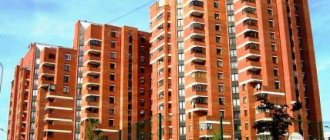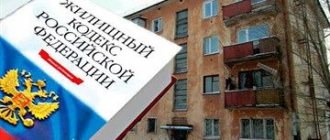One of the owners does not pay utility bills
It is not always possible to live peacefully with your neighbors, especially if you have to share the same living space with them.
Often problems arise due to failure to pay utility bills by one of the owners. Is this issue solvable?
Personal accounts section
In accordance with Article 210 of the Civil Code of the Russian Federation, the owner of the premises must pay utilities. If the apartment is in shared ownership, then each shareholder must fulfill this obligation in proportional distribution according to the share.
If one of the owners does not temporarily live in the apartment, the obligation to pay utility bills is not lifted (Article 155 of the Housing Code).
But what if one of the owners does not repay the accrued amounts?
The optimal solution is to divide payments for housing and communal services.
In accordance with Article 247 of the Civil Code of the Russian Federation:
- All owners can own and use the premises by agreement;
- each participant will have to pay on a separate receipt, but payment is made to one personal account;
- invoice receipts can consist of several invoices - for each owner.
To split the bill in this way, you should contact a representative of the management organization or HOA with a prepared application and collected certificates of ownership.
If one participant refuses to split payments, then you have the right to resolve this issue in court.
Law on payment of utilities by participants in common property
Russian legislation ensures that co-owners of shares in residential real estate are responsible for the maintenance and preservation of this housing. They are obliged to pay utility bills on personal accounts and the debts that arise on them.
Moreover, the responsibility for maintaining the property falls on the shoulders of each owner, in accordance with the size of the share (Article 249 of the Civil Code of the Russian Federation).
Let us list other legal acts, according to which, payment of utilities and other expenses associated with the maintenance and preservation of shared property will be borne by all participating owners of such housing:
- Article 30 of the Housing Code of the Russian Federation. It stipulates the responsibility of the owners for the maintenance of common property and payment of common house expenses, all rights and obligations.
- Article 153 of the RF Housing Code. It talks about the obligation of owners to pay for consumed utilities in full within the allotted time.
- Article 155 of the RF Housing Code contains a list of services that are subject to payment.
- Article 210 of the Civil Code of the Russian Federation says that the owner bears the burden of maintaining the property he owns, unless otherwise provided by agreement or law.
- Article 249 of the Civil Code of the Russian Federation fixes the obligation to pay all expenses associated with the maintenance of property.
Please note that non-use of the premises by the owners is not a valid reason for non-payment of housing and communal services. This is stated in Article 155 of the RF Housing Code.
Liability for non-payment
What responsibility awaits apartment residents if one of the owners does not pay utility bills?
If you pay for services using a separate receipt, you will be able to prove that you are fulfilling your obligations in full. The debtor will be personally liable.
Interested in the new law on utility bills for 2021? See here.
Is it possible to evict?
According to Article 3 of the Housing Code of the Russian Federation, no one has the right to evict from housing or limit the right to use premises or receive housing and communal services, except for structures authorized to do so.
The governing body does not have the right to evict citizens who are debtors. Only the court can do this. But please note that no one can force you to pay off someone else’s debt.
If the owner does not have the right to use the premises in accordance with regulations, or such a decision is made by the court, then he must vacate the premises (Article 35 of the Housing Code of the Russian Federation).
In the event that a citizen does not evict within the time period established by law, the decision to evict will be controlled by the authorized bodies.
The procedure for eviction is stated in Article 31 of the Housing Code of the Russian Federation. In case of termination of membership in cooperatives, the person will have to vacate the premises within 2 months from the date of such decision. If the cooperative is liquidated - from the moment of liquidation.
Recalculation if not staying
Certain types of utilities (which can be calculated in accordance with consumption standards) may be paid recalculated for the period when a person does not live in the premises.
The owner of an apartment share can make a recalculation for the time when he was absent or he actually has a different place of residence (in case of divorce, moving to another premises).
Recalculation is made when submitting an application from a citizen who does not live in the apartment, upon presentation of a certificate of temporary registration in another facility.
This is important to know: Statement of claim for collection of utility bills: sample
The citizen attaches a photocopy of the receipt for repayment of the debt for utility bills regarding the premises where he lives.
You can recalculate at:
- water (cold and hot);
- gas;
- electricity;
- sewerage
If a certificate of residence in another apartment is not submitted, the person will be considered to live at the place of registration. Then receipts will arrive according to the number of homeowners.
Collection from the employer
Housing may belong to residents by right of ownership, which is confirmed by the corresponding entry in the Unified State Register, or residents may live in municipal apartments on the basis of social tenancy agreements. In both cases, utility bills must be paid on time.
Let's consider the option when tenants allowed the formation of overdue debts for payment of housing and communal services. It would seem that the owner is responsible for the debts; in this case, the owner is the municipality. But in reality, everything is not quite like that. In the Civil Code of the Russian Federation, as well as in the Housing Code of the Russian Federation, there are no norms that would oblige the municipality to reimburse management companies for the debts that were incurred in paying housing and communal services from tenants.
The tenant is obliged to pay housing and communal services on time , this follows from the provisions of the social tenancy agreement, as well as clause 5, part 3, art. 67 Housing Code of the Russian Federation, Art. 678 Civil Code of the Russian Federation. The employer is obliged to pay the receipts himself. This means, in particular, that the tenant has no right to shift this responsibility to anyone else. For the same reason, when such a debt is formed, collection is directed specifically to the tenant, and not to the owner (municipality).
In recent judicial practice, claims of this kind have already taken place. A typical example of this is the Resolution of the Seventh Arbitration Court of Appeal dated June 1, 2010 No. 07AP-3423/10 in case No. A45-28525/2009. The management company filed a lawsuit against the local government. Amounts of debt owed by residents of a municipal apartment building were presented for collection. The claim was brought against the municipality on the grounds that the residents refused to voluntarily pay their utility debts. The court declared the claim not subject to satisfaction.
The management company argued that since the tenants themselves did not have the property and money to pay for housing and communal services, the owner of the property was responsible for their debts. The court found that in this case it was impossible to impose a subsidiary obligation on the landlord (the municipality) to pay for housing and communal services. The court considered that the claim could be brought in accordance with Art. 83 and 155 of the Housing Code of the Russian Federation, when only the difference, when it occurs, between the amounts of payments made by employers and the amounts to be transferred in accordance with the management agreement is subject to compensation. Such a difference arises when the debt is calculated for a period, only part of which is covered by the social lease agreement, and in the remaining time the housing was empty and was only on the balance sheet of the municipality.
Arbitrage practice
According to the law, the shared owner who does not live in the apartment must pay for the maintenance of the house, repairs and heating. Other services will be calculated depending on certain cases.
The participant is not obliged to pay for gas, electricity and water if he does not live, but a controversial situation may arise.
It happens that owners decide through the court the issue of collecting the required amount from the debtor. But it often happens that the management company independently goes to court. In this case, claims will be made against all owners.
If you have proof that you paid, then there should be no problem. In the absence of separate payment, it will be very difficult to defend this fact.
If you contacted the management company with a request to send a separate receipt to each owner, but received a refusal, you can file a claim in court:
- the court will recognize such a decision as unlawful and will oblige the management company to enter into agreements with each participant separately, according to which the payment will be calculated in accordance with shares;
- It happens that representatives of the management company do not agree with such a decision and file a lawsuit to appeal it. The court will refuse to satisfy the demands.
Collection by court order
Until June 2021, the courts did not agree to issue court orders to applicants to collect debts for housing and communal services, since such a requirement was not contained in Art. 122 Code of Civil Procedure of the Russian Federation. Higher courts viewed the issue similarly. It happened that the magistrate's court issued such an order, but district courts often overturned it.
On June 1, 2016, changes to the Code of Civil Procedure of the Russian Federation came into force . Debt for housing and communal services can be collected by filing a claim for collection from a member of the HOA or construction cooperative. In accordance with the new edition of Art. 122 of the Code of Civil Procedure of the Russian Federation, a court order will be issued if there is a demand for recovery:
- Debt for rent and utilities, telephone services.
- Debt for mandatory contributions from members of a homeowners association or construction cooperative.
Important: in Art. 122 only HOAs are indicated, there is no talk about partnerships of real estate owners, so they will not be able to apply for a court order. In accordance with Art. 135 of the Code of Civil Procedure of the Russian Federation, from now on, collection of debt for housing and communal services is possible only by court orders, and it is no longer possible to file a statement of claim with such demands.
Within 5 days after filing an application, an order is issued without a trial (Article 126 of the Code of Civil Procedure of the Russian Federation). The parties are also not summoned to court. Notification of debtors about the issuance of a court order is carried out in accordance with Art. 128 of the Code of Civil Procedure of the Russian Federation - the judge sends a copy of the order to the debtor, and within 10 days after the date of the order itself, the debtor can file his protest.
If within the prescribed period the debtor’s objections are received by the court, then under Art. 129 of the Code of Civil Procedure of the Russian Federation, the judge will cancel the order and explain to the plaintiff that he has the right to file a statement of claim with the same requirements. Copies of the decision to cancel the court order are sent to the parties within 3 days after its issuance.
What is the result? If the debtor has no objections to the merits of the demand presented, then a court order will avoid a lengthy trial. But practice shows that debtors always raise their objections, if only for the sake of canceling the court order and delaying the proceedings. It makes sense for the plaintiff to seek debt collection through a court order, since with this procedure the state duty is paid only in half (Article 333.19 of the Tax Code of the Russian Federation).
FAQ
What to do if there is a debt on utility bills due to the fault of the second owner of the apartment? What rules should former family members adhere to? Let's consider what to do in such situations.
How to attract a second owner?
Even if the co-owner of the apartment does not live in the premises, he is obliged to pay for the provided utilities.
Apply to the participant himself to repay the debt, and if he refuses, file a claim in court:
- in relation to certain types of utilities (mentioned earlier), if they were not consumed, then the obligation to pay them does not arise;
- the remaining payments must be made according to the size of their share of the premises in apartment buildings.
The limitation period is no more than three years.
Is it possible to buy an apartment with debts on utility bills in 2021? Read here.
Do you need judicial practice in collecting debts on utility bills? It is presented in this article.
Former family member
Let's look at the situation using an example:
- Citizen Ivanov lives in the owner’s premises as a former family member.
- The owner is demanding not only to pay for half of the housing and communal services, but also to carry out major repairs of the property, which is in the common possession of the residents of the apartment building.
- Ivanov argues that such a requirement does not comply with the rules described in Article 39 and Article 158 of the Housing Code of the Russian Federation, which stipulate that the owner participates in the costs of maintaining common property objects in accordance with the share in the rights of common property. The citizen refuses to pay because he is not a shared owner.
Such actions will be considered illegal. A person must rely on the procedure specified in Articles 31 and 32 of the Housing Code of the Russian Federation, where there is information that residents must participate in the costs of such a plan.
Ivanov should come to an agreement with the owner, because he could simply be evicted as a tenant, having lost his rights to residential real estate.
If the shared owner of an apartment does not pay utility bills, this does not mean that his responsibility passes to you.
In accordance with legislative acts, you have the right not to repay someone else's debt, and if such a demand is presented to you, you can sue for extortion.
Collection from a minor
The very idea of collecting money for housing and communal services from a minor may visit the parent who left the joint living space after the divorce. The line of reasoning in this case is as follows: since the ex-spouse does not live with the children, then he is not obliged to pay for utilities, since he already pays alimony.
The courts do not agree with this point of view. Parents, according to Art. 61 of the RF IC in relation to their own children have equal rights to each other and are obliged to bear the costs of their maintenance together. The same applies to paying for housing maintenance. In this case, the fact of separation and payment of alimony does not relieve either of the parents from the obligation to pay for housing.
When, after a divorce, the second spouse moves out of the apartment, and the housing itself belongs not only to the parents, but also to the children, the parents are obliged to bear the costs of maintaining the children’s share together. If the spouse who has moved out does not want to pay for the children’s share, then this money can be recovered from him through a recourse claim, or as a debt, if the spouse remaining with the children pays only his share of the obligatory payments.
In the eyes of the law, children until they reach the age of 18 are not responsible for their maintenance . This responsibility rests with their parents, guardians, and other legal representatives. Thus, it is impossible to bring a claim for collection of housing and communal services debt against a minor; you can file claims in court against his legal representative. The legal representative of the minor will be recognized as the appropriate defendant.
Video about non-payment
- Due to frequent changes in legislation, information sometimes becomes outdated faster than we can update it on the website.
- All cases are very individual and depend on many factors. Basic information does not guarantee a solution to your specific problems.
That's why FREE expert consultants work for you around the clock!
- via the form (below), or via online chat
- Call the hotline:
APPLICATIONS AND CALLS ARE ACCEPTED 24/7 and 7 days a week.
Who is required to pay for housing?
In accordance with Art. 210 of the Civil Code, the burden of maintaining property owned by a person rests with its owner, unless the agreement or law provides otherwise. Utilities are one of the types of maintenance assigned to homeowners. However, this rule applies to residential real estate with some nuances. According to paragraph 2 of Art. 153 of the Housing Code of the Russian Federation, the law provides a list of persons obliged to pay for residential premises and utilities:
- tenants who received housing under social tenancy agreements;
- tenants of premises of state and municipal housing stock or tenants under lease agreements for such premises;
- members of housing cooperatives who received housing from the housing complex;
- owners from the moment their ownership rights arise;
- persons who accepted residential premises from the developer under the relevant act;
- developers who did not transfer residential premises to customers;
- state/municipal authorities prior to occupancy of the relevant residential premises.
Note!
For different categories of payers, different housing payment structures have been determined.
According to Art. 154 LCD it consists of:
- payment for the use of housing;
- payment for the maintenance of premises;
- payments for utilities;
- contribution for major repairs.
Obligations to pay housing and communal services
According to Russian law, property owners are required to pay monthly utility bills, as well as bear the costs of maintaining and repairing common property.
Moreover, this responsibility is assigned not only to home owners, but also to members of their families living in the same territory.
Unless otherwise provided by agreements with utility service providers or service management companies, payments for housing and communal services must be made no later than the 10th day of the month following the reporting period.
This legislative provision allows utility companies to supply natural resources to apartment and private buildings around the clock, maintain the necessary communications in proper form, and fully fulfill their obligations to recipients of housing and communal services.
Legislative acts
The most important articles of the Housing Code of the Russian Federation regulating the responsibility of payers and property owners in the field of payment for housing and communal services are:
| Article No. 30 | regulates the responsibility of owners for the maintenance of common property |
| Article No. 153 | obliges owners, tenants and other persons living in residential premises to legally pay for consumed utilities in full within the allotted time |
| Article No. 155 | provides a list of services subject to payment by owners, tenants and other persons living in residential premises (maintenance of the house, payment for consumed utilities, expenses for current and major repairs of the house) |
| Article No. 8 | regulates the responsibility of participants in housing cooperatives, as well as their obligation to contribute the necessary amount to pay for housing and communal services |
| Article No. 10 | establishes the possibility of expelling a citizen from a housing cooperative if the rules are not followed and cooperative contributions are not paid |
Share owner
Shared ownership in the eyes of ordinary people looks like a kind of family investment.
In fact, joint ownership of something, such as real estate, often turns into a common headache.
The most common participants in shared ownership are:
| Spouses | legally married or divorced |
| Close relatives | parents, children, brothers, sisters who received common property during privatization or as an inheritance |
| Residents of communal apartments | initiated the privatization procedure |
Despite the fact that shareholders are usually not strangers to each other, a huge number of problems and misunderstandings arise.
This is due to the fact that at the moment the ownership of real estate arises, the obligation to maintain this property also arises.
The question often arises: who should pay utility bills - the registered owner or the owner who does not live in the apartment?
Many shareholders do not live on their square meters and believe that by doing so they protect themselves from all financial claims in the field of paying for utilities. This is partly true.
As for paying for consumed utilities (heating, water supply, gas supply, sewerage), the owner who does not live in a shared apartment or house is not obliged to pay for what he did not use.
Video: if the owner does not want to become a member of the HOA
But as for the costs of maintaining the house, current and major repairs, the obligation to pay them in proportion to your share does not depend on permanent residence or absence in a shared apartment.
What to do if one of the owners does not pay
If the residential premises are in shared ownership, the burden of maintaining it and paying for utilities falls on each of the housing owners in proportion to the size of the owned share under Art. 249 Civil Code. The owner of a ½ share in the ownership of an apartment must pay ½ of the utilities and other mandatory payments, regardless of whether he lives in the premises he owns and whether he uses utilities.
This is important to know: Law on debt collection for utility bills: actions and collection procedure
If such a co-owner refuses to maintain a share of the common property or does not participate in paying utility bills without an agreement, other owners have the right to share personal accounts with him.
Note!
Following the logic of Art. 155 of the Housing Code, each of the owners of shares in the ownership of housing may require the management company, HOA, housing cooperative, utility service provider to enter into an independent agreement for the supply of utility resources, management, and maintenance of apartment buildings. This gives the right to pay for residential premises and utilities on the basis of a separate payment document, in proportion to the share of ownership.
To conclude such an agreement and separate personal accounts, it is enough to contact the management company, homeowners association or resource provider with a free-form application. After such a division, the cost of the communal apartment in the receipts of each of the owners will be proportional to his share, and the owner who refuses to participate in the maintenance will accumulate personal debt.
Applying to the court for the division of utilities and payments related to the maintenance and preservation of property
The owner of a share in the common property can pay for the utilities himself - and then recover part of it through the court from other homeowners. For example, if an apartment is divided between two citizens, then he can recover half of the expenses incurred.
This applies not only to utility bills for electricity, gas, water, but also to expenses for common property, major repairs, replacement of meters, verification of equipment, etc.
Which court should I go to?
- If the amount of the claim is less than 50,000 rubles, then the application is submitted to the World Court.
- If the amount of the claim is more than 50,000 rubles, then go to the District Court.
- Claims to determine the procedure for paying rent that are not subject to assessment are within the jurisdiction of the District Court.
- You should apply to the court at the defendant’s place of residence.
- If the debt does not exceed 500,000 rubles, the case is considered in the order of writ proceedings.
- In cases where the Magistrate returned the claim on the basis of Part 3 of Article 125 of the Code of Civil Procedure or the Order was cancelled, the case will be considered in the manner of claim or summary proceedings.
Deadline
Utility costs and other costs of maintaining the property can only be recovered for the last 3 years.
That is, if you go to court for the division of communal services in June 2021, then the calculation should be made from June 2021 to June 2021.
Resolving the issue through court
If an agreement on the division of property between the co-owners of the property has not been reached or the management company has refused to enter into a separate agreement with the applicant owners, the issue can be resolved in court. To do this, interested co-owners file a claim to establish the procedure and amount of payment for housing and utilities, division of personal accounts and making payments based on separate payment documents. This was established by the Supreme Court in response to question 27 of the Review of the practice of the Supreme Court of the Russian Federation for the fourth quarter. 2006.
In court, you will have to justify your position by presenting to the court evidence of the co-owner’s non-participation in paying for utilities. A positive court decision will be the basis for separating personal accounts and sending different receipts to co-owners.
Note!
Representatives of the management company are usually involved as a third party in such cases, so filing an additional application to separate accounts is not required.
Agreement between the parties to pay for housing and communal services - is it necessary to go to court?
Shares in property rights can be established by a settlement agreement or a court decision (Article 244 of the Civil Code of the Russian Federation). According to the prescribed conditions, participants in shared property must be responsible for it, including fulfilling obligations to make timely payments for utility debts.
- Any participant in shared property may demand through the court to conclude an agreement on the procedure for paying for utility services, in proportion to each person’s share.
- But there is no need to go to court. If the parties can agree, then it is enough to go to a notary and draw up the agreement in documentary form.
If the owners cannot come to a mutual decision—for example, if one insists that he does not live in the property—then it is worth resolving the issue through the courts.
After you have the agreement in your hands, you must send it to the provider of housing and communal services, the management organization, and the companies with which the agreement was concluded with the original owner.
The agreement should be accompanied by a statement written jointly by all owners. It must indicate a request to make charges, in accordance with the new conditions fixed in the agreement, and to issue each owner with their own payment receipt.
The management company has the right:
- Divide personal accounts, make each owner their own account. Everyone will be sent their own receipts.
- Do not divide personal accounts, but issue separate receipts. We will talk about this below.
This method of payment for services allows you to balance the rights of each participant in shared ownership, and force those who ignore the legal requirements of housing and utility companies to pay utility bills.
It may be suitable both for citizens who were able to come to an agreement (after all, an agreement can be drawn up without a trial), and for those who have been fighting for the division of financial responsibility for common property for many years (in this case, only the court will help).
Read more: Disturbing the silence at night, where to contact
By the way , a representative of the Management Company or a housing and communal services organization, or the owner himself, whose rights have been infringed, can file for collection of a utility debt.
Measures to influence debtors
If the co-owner continues to evade paying utility bills, he will accumulate debt, on the basis of which he will be brought to civil liability:
- accrual of a penalty in the amount of 1/300 of the Central Bank rate for each day of delay on the amount of debt in the period from 31 to 90 days from the moment the payment was due to be received, and in the amount of 1/130 of the rate for each day from the 91st day to day of actual repayment of the debt - Art. 155 LCD;
- suspension or restriction of utility supplies;
- forced debt collection.
The management company takes the debtor to court, where, in addition to the debt, he is also charged a penalty. The writ of execution received on the basis of a court decision is transferred to the district OSB for forced collection of debt through bailiffs. They can seize a share of the apartment, describe the property, and foreclose on wages.
Note!
If this is not the owner, but the tenant of the property under a social tenancy agreement, and the amount of his debt exceeds the payment for 6 months, the landlord has the right to evict such a debtor through the court under Art. 90 Housing Code of the Russian Federation.
Determining the procedure for paying utility bills in shared ownership
The obligation to pay for utilities is specified in Articles 30 and 153 of the RF Housing Code. Regardless of who exactly lives in the apartment/room (the owner or the tenant), he is obliged to pay utility bills on time and in full. Moreover, even if a person does not actually live in the apartment/room in question, he is still required to pay for utilities.
Payments for shared ownership
Most often, the problem arises if the apartment is in shared ownership. Such a procedure for owning real estate implies the need to bear responsibility for housing exactly to the extent that a person owns.
Recalculation of payments
Based on RF PP No. 307, any owner of real estate (including shares) has the right, if he does not live in the premises for a long time (or does not live in principle and does not rent it out), to apply for a recalculation of payments. Thanks to such a system, you can save significantly and avoid the occurrence of serious debt and, as a result, possible problems with co-owners.
Procedure
- Prepare documents proving the fact that the person does not live in his share of the apartment. Among them there should be documents stating that the same owner lives in another place and regularly pays for utilities there.
- Prepare an application for recalculation (see sample below).
- Send documents and application to the management company (management company).
- Wait for recalculation and pay for services according to the new conditions.
Documentation
An approximate list of documents for recalculation:
- Documents confirming the fact that a citizen is undergoing treatment in a sanatorium, on a business trip, a tourist trip, and so on.
- Tickets for train, plane, etc.
- Bills from hotels, motels, hostels.
- Certificate of temporary registration at another address.
- Receipts for payment of utility bills at another address.
This is important to know: Calculation of penalties for utility bills under Art. 155 Housing Code of the Russian Federation
Application for recalculation
Deadlines
Review of such applications takes about 5 days. If there is no answer within this period, you can go to the Criminal Code and clarify the fate of the document, but there is no point in swearing or demanding to work faster since strict deadlines are not established by law. But if the delay is too significant (for example, 1 month or more), you can go to court and attach to the claim your copy of the application with a note about filing with the Criminal Code.
Penalty for non-payment of utilities
Failure to pay or untimely payment of utility bills involves the accrual of a penalty in the amount of 1/300 of the refinancing rate of the Central Bank of the Russian Federation (clause 14, article 155 of the Housing Code of the Russian Federation). As of January 14, 2019, the refinancing rate is 7.75%. Thus, 1/300 part is approximately 0.026% per day.
However, penalties are not assessed immediately, but rather 31 days after the payment deadline has arrived. From this moment on, a penalty in the specified amount will be charged on the debt for 90 days. Starting from 91 days, the penalty amount will increase to 1/130 of the refinancing rate (0.060%)
Collection from registered persons
A registered person is a citizen who has duly registered at a given address with the Federal Migration Service, as evidenced by an entry in the house register, as well as a stamp in his passport.
All persons living in this living space must jointly bear the responsibility for paying utility bills. Of course, we are not talking about minors who do not have income, as well as other categories of dependents.
According to the current procedure, every month before the 10th day, every citizen registered in an apartment or other residential building is obliged to pay utility bills, according to meter readings or established tariffs. According to paragraph 1 of Art. 155 of the Housing Code of the Russian Federation, the payment deadline for utility bills can be changed. To do this, it is necessary to conclude a special agreement with the management company, or set a different payment date at a meeting of the homeowners association.
The basis for payment for any type of utility service is a receipt. Today, at their discretion, payers can receive receipts in a traditional printed format, or pay directly on the websites of service providers by filling out electronic receipts.
The first measure after a delay in a current payment is to collect the debt and assign a penalty. The payer’s refusal to repay the debt and pay the penalty entails restriction or suspension of the supply of services. The last resort is to take the utility service provider to court.
Penalties for late payments will be reflected on the subsequent payment receipt. The payer will be able to see it immediately and, if funds are available, can pay along with all current payments. Non-payment will force the management company or utility provider to begin implementing an algorithm to limit or suspend the supply of services :
- Before introducing any restrictive actions against the debtor, an official warning is sent. It is sent by registered mail with notification or personally delivered to the debtor against signature. This is done 20 days before the expected date of introduction of restrictive actions.
- In the absence of payments and if technically possible, the supply of utility services is limited 20 days after the warning is issued.
- If the debtor still does not pay his debts within another 30 days, the supply of the service will be completely stopped. This rule does not apply to the supply of cold water and heating to apartment buildings. 3 days before the date of complete stop of deliveries, the defaulter is once again officially warned about this in writing.
- When the debtor fully repays his debts, the service begins to be supplied again within up to 2 days.
What to do if the owner of a share in an apartment does not pay rent
If one or more owners of a share in an apartment do not pay rent, there are two main ways to solve the problem:
- Discuss the problem with such owners and demand that the debt be repaid within a certain period of time. This method works extremely rarely and only when a person has really simply forgotten about the need to pay for services. Most often, if he does not pay consciously, then no negotiations will lead to anything.
- Submit an application to the Criminal Code for the division of payment accounts based on the size of the shares. The most optimal and almost always working method. After this, each owner will receive his personal account, and he will pay only what is calculated there. The only drawback is that all tenants-owners of the apartment are required to consent to such a division. But if at least one of them is against it, you can file a lawsuit demanding that this procedure be forced. As a basis, you can point to the fact that the unwilling person has a lot of debts and that is why he does not want to split the accounts.
Procedure
Since splitting the account is the most optimal course of action, let’s consider it in more detail. What do we have to do:
- Discuss the essence of the problem with all owners of shares in the apartment. Get everyone's consent.
- Prepare documents and an application (the latter is usually drawn up directly when submitting it to the Criminal Code).
- Send the application and documents to the Criminal Code.
- Receive a response to the application.
Documentation
There is no need to attach any special papers to the application. Usually, the consent of all owners and documents confirming their ownership of shares in the apartment in question, as well as their passports, are sufficient.
Application for splitting an account
Costs and deadlines
Submission of this type of application is free of charge. There is no need to pay any state duty. The review period depends on the Criminal Code itself, but in most cases it rarely exceeds 5 days. After the application is considered and satisfied, the others will not be concerned about further problems with the debts of one of the owners.
Even if, by a court decision, the share is sold to pay off the debt, all other owners will receive a priority right to buy it out, so you can easily avoid a completely third-party person moving into the apartment.








